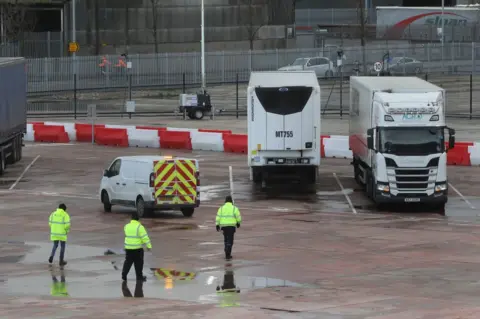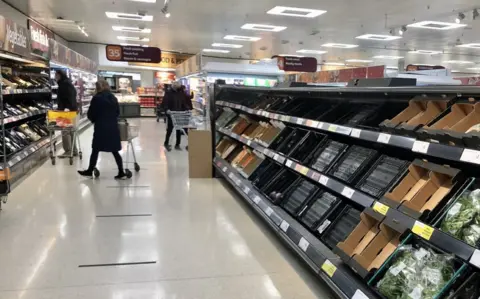Irish Sea border: What will happen once the grace periods end?
 PA Media
PA MediaAt 23:00 on New Year's Eve a new EU trade border was effectively created in Northern Ireland's ports.
It is, in many ways, unlike the EU's other frontiers.
One difference is the EU's usual rules on customs and product standards are not yet being fully enforced.
This is due to what are known as grace periods - essentially time for NI businesses and their suppliers in the rest of the UK to adapt.
The first of these grace periods is set to expire at the end of March and businesses are already anxious about what comes next.
Food products
The grace period for food means that some businesses, particularly major retailers, do not need to comply with all the EU's usual certification requirements when importing products from the rest of the UK.
At the centre of the EU's food safety procedures are what are known as Export Health Certificates (EHCs).
These involve a vet, or other professional, signing off a complex piece of administration for every consignment of products of animal origin - meat, fish, dairy and eggs.
Supermarkets and other retailers feared their systems would be overwhelmed so they have been granted three months where some products do not require EHCs.
However it is those products which do require the certificates which will give us an indication of what might happen at the end of the grace period.
 PA Media
PA MediaThe EU considers processed meat products like mince or sausages to be high-risk goods, so they do need to be certified.
However the relevant EHCs for these products did not actually exist until last week.
They were published by the UK government alongside instructions that they must be used from 22 February.
Retailers see that as a highly significant date.
It will be the first real test of how the EHC process works for supermarkets and should help to answer some key questions such as - are there enough vets to sign the certificates?
If it causes problems then there could be worse to come when all relevant products need EHCs from 1 April.
The supermarkets have already warned that the system will become unworkable if the grace period expires without a long-term solution.
Simply rolling over the grace period on the exact same terms seems unlikely.
The government declaration in December, which detailed the grace period stated: "The UK accepts this solution is not renewable."
Publicly the government has said a dedicated team is working with supermarkets, the food industry and the NI Executive to develop ways to streamline the movement of goods.
Privately those close to the process are emphatic that the grace periods will not just come to a sudden stop in April.
Northern Ireland businesses would like the European Commission to show maximum flexibility on this issue and are beginning to express frustration at the commission's currently unbending attitude.
Parcels and online shopping
Northern Ireland is continuing to enforce EU customs rules at its ports.
So strictly speaking all commercial parcels entering from the rest of the UK should require customs declarations.
For now they do not, due to a three-month grace period.
But as with the food grace period there are nuances and complications.
Parcels carrying goods valued at £135 or below do not need declarations. Nothing has changed for either sender or receiver.
 Getty Images
Getty ImagesBut parcels over £135 do require a declaration and there are new procedures for people posting excise goods, which mostly means alcoholic drinks.
This grace period was announced very late, just hours before the Brexit transition period expired.
So in practice the picture with online retailing from GB to NI is messy.
Some companies have suspended deliveries, others have increased delivery times, some are submitting customs declarations for all parcels and others are carrying on as before.
Again it is not yet exactly clear what is going to happen on 1 April.
However Amazon, the biggest online retailer, has made clear it is preparing for significant change.
It has told its marketplace sellers (companies who use the Amazon platform) that customs declarations will be required for GB-NI parcels.
It is also preparing to remove some items for sale to Northern Ireland customers - these are products which require special export procedures or are more likely to be physically checked on entry to NI.
It's understood that some other retailers are also working on their online inventory systems which will also allow them to separate these higher-risk goods from more straightforward shipments.
Amazon also appears to be making a medium term plan to ease trade across the Irish Sea by opening its first fulfilment centre in Ireland.
The property news website React News says the firm has agreed to lease 600,000 sq ft (55740 sq m) at a business park near Dublin.
Amazon already has last-mile delivery facilities in both Northern Ireland and the Republic of Ireland.
But what is being planned is a much more significant operation with an inventory of goods being held in Ireland to be picked, packed and shipped to customers across the island.